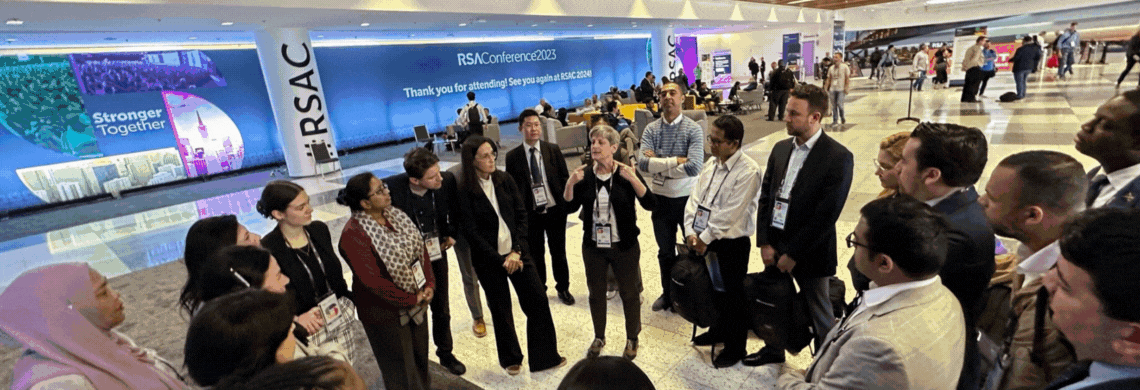The Great International Exchange Community: A Response To Global Ties U.S. Community Impact Study
By Evy Vannoy, Program Associate, International Visitors Leadership Program, Meridian International Center

The public diplomacy community has long acknowledged the value of exchange programs. However, such efforts to advance mutual understanding and bolster global connections are inherently challenging endeavors to quantify.
How much does meeting a group of international visitors impact a local community? To what extent does one’s cultural awareness increase as a result of these interactions? Data that addresses the impact of human connection is challenging to capture. Despite this, in its inaugural study, The Global Ties U.S. Community Impact Report, released by Global Ties U.S. (GTUS) on August 31, 2023, demonstrated the positive impact of exchange programs on local American communities that engage with international visitors.
Meridian International Center has been a leading partner on the U.S. Department of State’s International Visitor Leadership Program, engaging with fellow members of the GTUS network for over 60 years to support exchanges that advance global cooperation and positive international ties. Each year Meridian hosts nearly
The GTUS Report sought to understand and identify the benefits that local volunteers and organizations gain from engaging with international exchange programs funded by the U.S. Department of State. The data collection survey for the report included 679 people from 58 local organizations in 37 states across the United States, spanning every region from coast to coast. Through this survey, GTUS was able to draw upon decades of combined experience with international exchanges, identifying the most salient and long-lasting community effects.
The GTUS Report defined impact as “resources that enable community members to operate more effectively in a global environment.” This definition led to identifying four categories of impact in local communities: Global Knowledge & Cultural Competence, Civic Engagement & Community Inclusion, Economic Impacts & Workforce Development, and International Connectivity.
Despite the reduced number of exchange programs due to the COVID-19 pandemic’s lingering effects, the GTUS network, which includes Meridian International Center, showed that communities who engage with international exchange participants experience benefits in all four of the categories identified above.
Global Knowledge and Cultural Competence
Qualitative responses and quantitative survey data shows that 86% of individuals and organizations improved their understanding of cultures and nations by interacting with international visitors, with 88% of respondents saying they are more likely to consider different cultural perspectives when faced with challenges. Many of the respondents furthered this learning by sharing their knowledge with their children, students, and local youth. One survey respondent wrote:
“I am a professor and I am able to share stories of meeting amazing people from around the world with my students. Sometimes the people I meet with Zoom into my classes. What I learn, I am able to share and it expands all our worlds.”
Across the 10 survey questions related to knowledge and culture, on average respondents agreed that their understanding of international issues and cultures benefitted from participation and interactions with exchange programs and visitors.
Civic Engagement and Community Inclusion
Findings from the survey indicate that those who engage with international exchanges are also more likely to volunteer in their community, with 77% saying they are more likely to participate in local community events that are sponsored by groups reflecting a national heritage different from their own. This data supports the idea that participation in exchange programs not only benefits local civic engagement but also improves appreciation for local diversity. The majority of respondents also reported gaining skills that improved their ability to contribute to their local community, such as volunteering to teach English as a second language.
Economic Impacts and Workforce Development
The study found that hosting exchange programs supports economic development in communities through knowledge exchange and elevating the image and prestige of local businesses. 80% of respondents agreed that international exchange programs “enhance the image of their community as a good place to live.” Through sharing best practices and creating connections with international peers and industry contacts, local organizations are able to advance their professional development and gain broader perspectives on economic interests. One respondent furthered detailed the value of these connections:
“The international visitors program has allowed my smaller non-profit to have open discussions with practitioners we would normally not have the opportunity to speak with about important human rights initiatives. We have a better understanding of how other cultures view human rights issues and interventions. We are often limited as we serve primarily local clients, but the program has offered professional connections internationally.”
International Connectivity
Social ties are a connecting aspect of international exchanges that is more commonly appreciated, though the importance and lasting impact of these bonds cannot be understated. 40% of survey respondents who self-identified as volunteers indicated they developed a close friendship with an international visitor and 19% of professional organizations indicated forming a business relationship with visitors they engaged. Involvement with international exchange programs unlocks a world of resources for individuals and organizations who previously may not have had access to global community. One respondent described the impact of their lasting connections as having “opened our eyes and horizons” and even allowed them to visit international visitors in their home countries.
